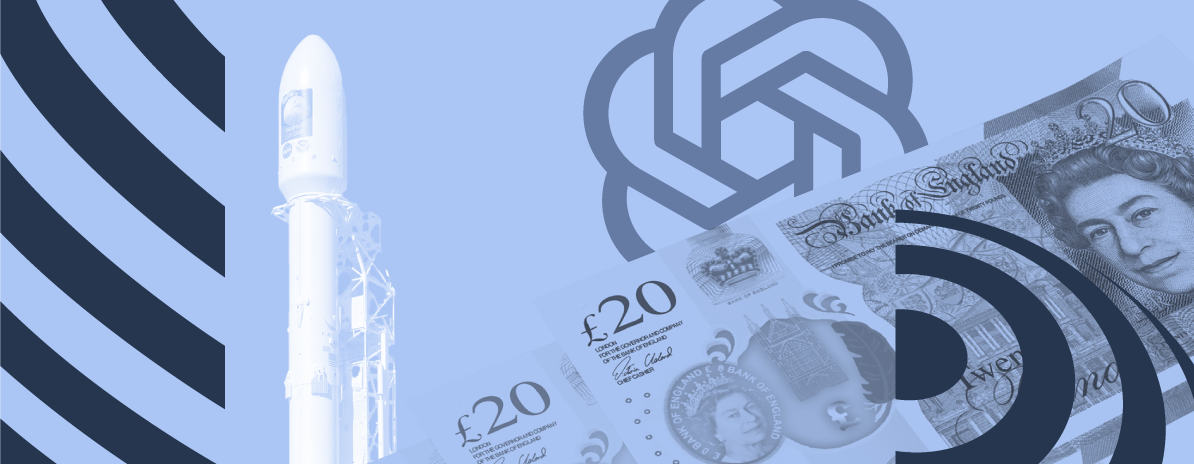As we embark on the fourth industrial revolution, the world is poised to undergo unprecedented transformations across various sectors, from technology and energy to healthcare and beyond.
Throughout our ‘Parallel Worlds’ series, we look at the key themes that are set to dominate not only the geopolitical landscape but also the potential effects on markets and society at large.
The year 2050 stands as a pivotal point in our collective journey, where the consequences of our present actions will shape the trajectory of human progress for generations to come. In this context, understanding and anticipating investment trends becomes crucial for individuals, organisations and governments alike.
AI
We start by looking at artificial intelligence (AI) which has been grabbing headlines in recent months.
The machine learning and AI sector has experienced rapid growth over recent years and investment in AI has skyrocketed over the past decade. In 2015, $12.5 billion was invested in the industry, which surged to over $93.5 billion in 2021, establishing it as a significant area of expansion. In fact, analysts predict that Microsoft’s market capitalisation could increase by over $300 billion due to advancements in artificial intelligence.
Not only established companies like Microsoft and IBM, but also numerous AI startups are actively involved in this rapidly growing sector.
Automation
Together with AI, automation represents a significant concern in terms of potential workforce displacement. Studies conducted by the World Economic Forum and McKinsey indicate that automation could displace millions of jobs by 2050.
Automation will have far-reaching effects on various sectors, including manufacturing, logistics, healthcare, agriculture, finance, and retail. While some jobs may be entirely automated, many others are expected to undergo significant changes. Routine and repetitive tasks are likely to be automated, allowing workers to concentrate on higher-level and creative work that necessitates human skills such as problem-solving, critical thinking, and emotional intelligence.
The implementation of AI and automation has the potential to enhance productivity and spur economic growth. A report by PwC suggests that AI technologies alone could contribute up to $15.7 trillion to the global economy by 2030. Furthermore, AI technologies may generate fresh opportunities in fields such as healthcare, finance, cybersecurity, and personalised services.
Nevertheless, it is crucial to note that the benefits of AI and automation may not be evenly distributed, potentially leading to income inequality if appropriate policies are not put in place. The emergence of artificial intelligence and automation in advanced societies could result in the displacement of millions of workers. Consequently, some countries may consider implementing a form of universal basic income (UBI) to mitigate the impact of this displacement.
Biomedical sciences
The world’s population is undergoing a significant ageing trend, primarily driven by advancements in biomedical technology and the increased availability of affordable treatments for various illnesses. These developments have led to improved life expectancy and quality of life for individuals worldwide.
One notable example of the rapid progress in the medical field is evident from the response to the coronavirus pandemic. Pharmaceutical companies have demonstrated remarkable agility in developing new vaccines to combat the threat posed by the virus. Collaborating with academics, researchers, and private financiers, these companies have successfully produced life-saving treatments within record timeframes.
As a result, the global population is projected to continue growing steadily, with a simultaneous increase in the average age of individuals across the world. This demographic shift presents both challenges and opportunities for societies, as they adapt to the evolving needs of an ageing population.
UBI
As the global population continues to expand and life expectancy increases, along with the looming threat of job displacement for millions of people, exploring alternative approaches to income distribution becomes vital. One potential solution that has gained attention is the concept of universal basic income (UBI).
UBI has already been trialled worldwide since the 1960s. The emergence of artificial intelligence (AI) and automation, which could lead to substantial unemployment in advanced societies, makes the implementation of UBI almost inevitable, in our view.
Studies have shown that a UBI scheme of £80 per week in London could decrease poverty by 5.7%, lifting over 130,000 people out of poverty. However, the benefits and drawbacks of UBI are multifaceted and pose challenges in achieving a proper balance.
UBI could have wide-ranging effects on consumer spending, economic growth, wealth distribution and government debt. Industries such as healthcare and education could experience increased demand as people gain greater financial freedom. Although sectors that rely on low-wage labour could face challenges due to a potential reduction in the workforce.
Space: the next frontier?
The recent surge in the popularity of SpaceX has captured the attention of people worldwide, as the frequency of rocket launches has increased while costs have decreased, safety measures have improved, and overall efficiency has been enhanced. This trend has paved the way for various opportunities, such as asteroid mining, space tourism, and the emergence of new companies seeking to challenge SpaceX’s dominance. Currently valued at approximately $140 billion, SpaceX shows promising signs of continuous growth.
A significant driving force behind space exploration is the potential for companies to reap substantial benefits. Asteroids hold vast reserves of valuable metals, including iron, nickel, cobalt, platinum, gold, and other elements that are scarce on Earth. These metals play a crucial role in numerous industrial applications, such as electronics, construction, and manufacturing. Additionally, certain asteroids contain volatile compounds like water, carbon dioxide, methane, and ammonia. Water, especially, holds great significance as it can sustain human life in space and be broken down into hydrogen and oxygen for use as rocket propellant.
ESG and SRI: The new normal?
The investment landscape is undergoing a significant shift towards environmental, social, and governance (ESG) investing, as well as socially responsible investing. What is currently considered a new investment style is expected to become the ‘new normal’ by 2050. This transition is being fuelled by the allocation of billions of dollars, both from private and public sources, towards various initiatives such as research, green technology, electric vehicles, and alternative energy sources.
According to a study conducted by PwC, institutional investment focused on ESG is projected to grow to 84% by 2026, equivalent to $33.9 trillion in real terms, accounting for 21.5% of total assets under management. This highlights the increasing significance of ESG considerations in investment decision-making. Factors such as legislation, boardroom diversity, and compliance also contribute to this trend.
ESG investing serves as a cornerstone theme in our investment strategy, reflecting our belief in the importance of socially responsible actions and the development of green technologies to combat climate change, including the adoption of alternative energy sources. We view this as a long-term perspective and anticipate that ESG investing will endure as a prominent force in the investment landscape.
*As with all investing, financial instruments involve inherent risks, including loss of capital, market fluctuations and liquidity risk. Past performance is no guarantee of future results. It is important to consider your risk tolerance and investment objectives before proceeding.





